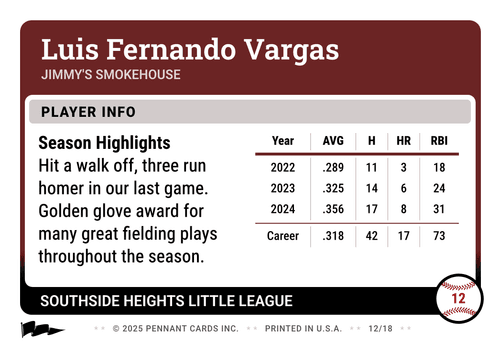Building a strong little league team goes beyond practicing skills and winning games. The most memorable seasons are shaped by meaningful rituals and intentional practices that help players connect with each other, feel valued, and develop a sense of belonging. Here are proven team-building rituals and best practices that coaches and team parents can implement to create a positive, cohesive team culture.

Make Sure Everyone Knows Each Other's Names
Before any practicing starts, before the first pitch is thrown, there's one essential team-building ritual that sets the foundation for everything else: making sure everyone knows each other's names. It sounds simple, but it's remarkably easy to overlook, especially when you're eager to get into drills and gameplay.
On the first day of practice, gather the entire team in a circle — players, coaches, assistant coaches. This is the moment to establish that you're all in this together. Use a guessing game to help everyone learn names through repetition.
Model Good Sportsmanship
Perhaps the most important team-building "ritual" isn't a scheduled event at all — it's the consistent, daily modeling of the behavior and values you want to see in your players. Young athletes are always watching how coaches react to strikeouts, errors, close calls, wins, and losses.
When coaches consistently demonstrate:
- Respect for umpires, even when calls don't go their way
- Grace in both victory and defeat
- Emphasis on effort and improvement over winning at all costs
- Encouragement of all players, regardless of skill level
- Positive communication with parents and league officials
...they create a culture where those values become the norm. Players internalize these lessons far more effectively through observation than through lectures. The coach who stays calm and positive after a tough loss teaches more about resilience than any motivational speech could.
Bring Treats and Snacks
Never underestimate the team-building power of snacks. If there's a team birthday or some other milestone, taking a few minutes to share a cookie or a sweet snack can bring a team together, especially if they're feeling down about a loss.
These small rituals don't need to be elaborate. A simple snack break where everyone sits together, a surprise treat after a particularly tough practice, or celebratory popsicles after a win — these moments create emotional touchpoints that players remember. They're opportunities to pause, connect, and acknowledge that being a team is about more than what happens during game time.
Some teams establish rotating snack schedules where different families take turns bringing treats for the whole team. This distributes the responsibility, gives every family a way to contribute, and ensures regular opportunities for these small bonding moments.
Develop Pre-Game Rituals
Many successful teams develop pre-game rituals that become part of their identity. These might include a specific warm-up routine, a team chant or cheer, a huddle with a rotating player offering encouragement, or a particular song that plays while they take the field.
The specific ritual matters less than the consistency and the sense of "this is what we do." These rituals help players transition mentally into game mode, create a sense of unity, and provide comfort and focus, especially before high-pressure games.
Consider involving players in creating these rituals rather than imposing them from above. When players have input into team traditions, they're more invested in maintaining them.
Take a Few Minutes After the Game to Reflect
While it's tempting to rush off after a game, taking a few minutes for post-game reflection as a team can be valuable. This doesn't mean dwelling on mistakes or rehashing every play. Instead, it's an opportunity to acknowledge effort, highlight good moments, and reinforce team values.
A simple post-game ritual might include having the team gather in a circle, with the coach highlighting 2-3 specific positive things they observed (from different players if possible), asking if any players want to share something they learned or noticed, and ending with a team cheer or acknowledgment.
This practice helps players process the game together, shifts focus from just the outcome to the experience and learning, and creates closure before everyone goes home.
End of Season Team Award Ceremony
A common little league tradition is the end-of-season award ceremony, where each player receives an award that highlights something particular about their contribution to the team. Rather than generic participation trophies, consider giving each player a baseball with their name and a unique award written on it.
Award Ideas That Celebrate Different Strengths:
- Most Versatile Player - For the player who stepped up to play multiple positions
- Most Clutch - For the player who delivered when the pressure was on
- Most Improved - For the player who showed the greatest growth throughout the season
- Most Enthusiastic - For the player whose positive energy lifted the whole team
- Most Dependable - For the player who showed up consistently and gave their all
- Best Teammate - For the player who always encouraged and supported others
- Hardest Worker - For the player who gave maximum effort in every practice and game
- Best Attitude - For the player who maintained positivity even through challenges
The key is to ensure every award is meaningful and specific to that player. Take time throughout the season to observe what makes each player unique. These personalized awards communicate to young athletes that they were truly seen and valued for their individual contributions, not just as part of a group.
Capture the Season with Trading Cards


Giving out trading cards for the team creates a keepsake that players and parents can enjoy for years. Unlike digital photos that get lost in a phone's camera roll, physical trading cards capture the players as a team at a specific moment in time.
Trading cards serve multiple team-building purposes. They give players something to trade and share with teammates, creating natural opportunities for connection. They provide a visual reminder of being part of something bigger than themselves. And they offer a keepsake that parents and players can look back on to remember the friends they played with and the season they shared.
Consistency Matters More Than Perfection
The most effective team-building rituals and practices aren't one-time events — they're consistent patterns that create a team culture. Whether it's the way coaches greet players at practice, how the team responds to errors, the traditions around celebrating achievements, or the small moments of connection throughout the season, these repeated experiences shape how players see themselves and their teammates.
Building a strong little league team isn't about having the most talented players or winning the most games. It's about creating an environment where young athletes feel known, valued, and connected to something meaningful. The ceremonies and practices mentioned here provide a foundational process for doing that.